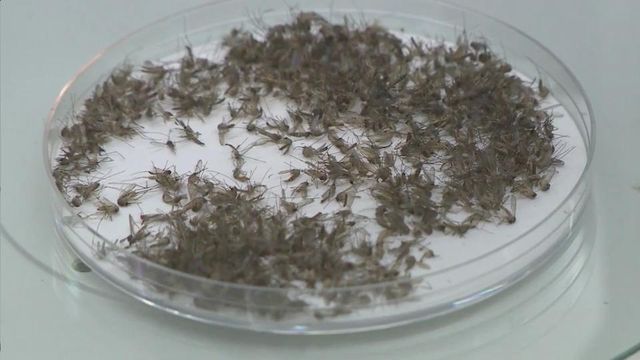Durham man is first 2015 death from West Nile virus
State authorities on Tuesday reported the first death of 2015 from a confirmed case of West Nile virus.
Posted — UpdatedThe state Department of Health and Human services did not release the name, age, gender, or location of the person who died, citing confidentiality laws. However, Charles Hogan identified the patient as his father, Roscoe Hogan.
Hogan said that his father died at Duke Regional Hospital on Aug. 27. The previous day, doctors told him that his father's lab results revealed West Nile virus.
Roscoe Hogan was 76 at the time of his death and had been a resident of Durham.
Hogan says his father went into the hospital with several symptoms, including dehydration, fever, and vomiting. He thought that his father's stay in the hospital would be a short one. They initially thought he was just dehydrated and hoped he would be able to come home after just two or three days.
He said that his father remained in the hospital for just over two weeks. Within the final four days, his father was taken to the critical care unit.
Hogan said that the family received a diagnosis of West Nile virus after a spinal tap was performed on his father.
"They were telling me there was no cure for West Nile virus," Hogan said. "There's not a vaccine for West Nile virus. The body's immune system has to be able to fight it off, just like the common cold."
The virus is transmitted to humans through mosquitoes, although a majority of people who become infected will not show any signs of the disease or experience only mild, flu-like symptoms.
However, the virus can cause more serious conditions – including encephalitis, meningitis or meningoencephalitis – that is fatal in about 1 percent of cases.
Hogan said that it's likely that his father contracted the virus while working out in the yard. He admits that he didn't think this would be an issue living in North Carolina and said that his family wasn't vigilant about repellent because they never imagined this would impact them.
"It's something we'd heard about in the past that happened out in the southwestern part of the country and across seas over in Africa, but you don't think about infected mosquitoes here in North Carolina," said Hogan.
The Department of Health and Human Services is now warning people to take preventative measures to prevent the virus.
"This is a tragic reminder that these infections, though relatively rare, can be fatal," Dr. Carl Williams, State Public Health veterinarian, said in a statement. "We see most cases of mosquito-borne illness in the months from August through October, but you can still enjoy your time outdoors by following some basic control measures."
The state Department of Health and Human Services recommends the following precautions:
- Use mosquito repellent that contains DEET (or equivalent) when exposed to mosquitoes. Use caution when applying to children.
- Install or repair screens on windows and doors to keep mosquitoes outside and if possible, use air-conditioning.
- Reduce mosquito breeding by emptying standing water from flowerpots, gutters, buckets, pool covers, pet water dishes, discarded tires and birdbaths at least once a week.
• Credits
Copyright 2024 by Capitol Broadcasting Company. All rights reserved. This material may not be published, broadcast, rewritten or redistributed.






